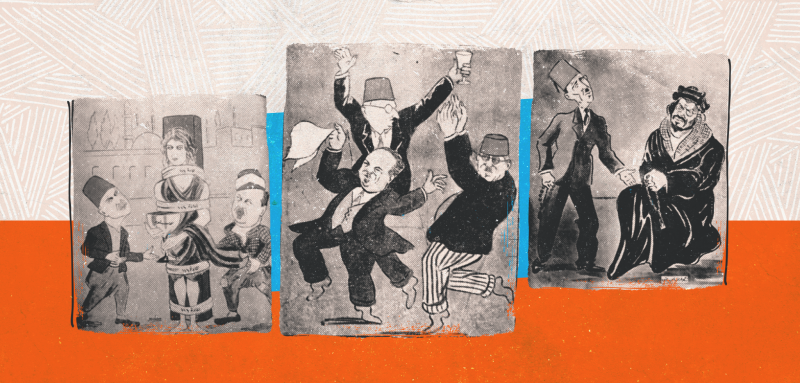Mario Morelli, the Italian artist, arrived in Damascus from Egypt in the summer of 1946. He learned that Syria had recently gained independence from France and that he would find job opportunities at one of the many local newspapers, weekly and monthly magazines.
Morelli met Habib Kahaleh, the owner of Al-Mudhik Al-Mubki (The Weeping Joker), a leading satirical political magazine. Morelli told Kahaleh that he was skilled in drawing the famous Mickey Mouse, a character in Walt Disney's international productions since 1928. Kahaleh apologized, explaining that his magazine focused on local matters, solely depicting Syrian politicians; according to him, his publications were for adults, and not for children.
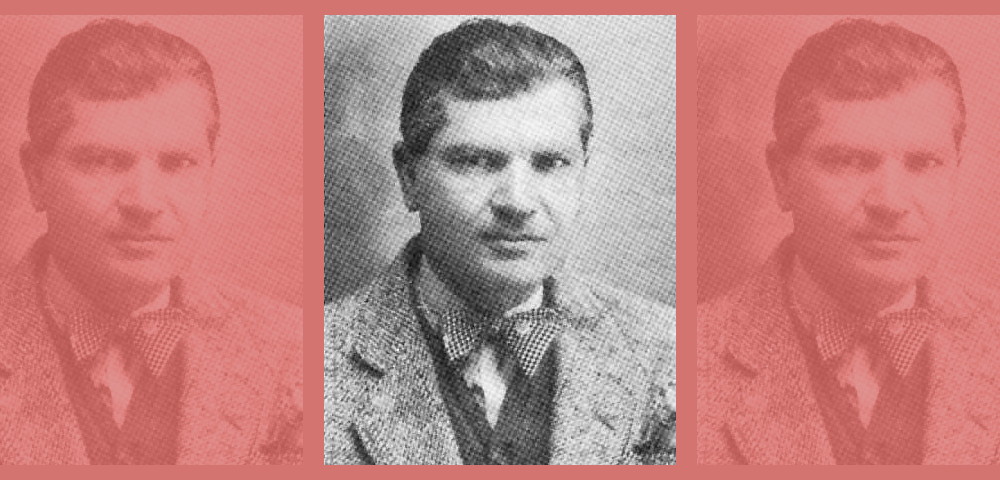 Habib Kahaleh, owner of Al-Mudhik Al-Mubki (The Weeping Joker)
Habib Kahaleh, owner of Al-Mudhik Al-Mubki (The Weeping Joker)
Al-Mudhik Al-Mubki was the first Syrian publication to devote a large section to political cartoons, placing caricatures on its covers since its first issue in 1928. Habib Kahaleh, a graduate of the American University of Beirut, was familiar with culture and kept up with major international newspapers, including the Egyptian publications that introduced satirical art to the Arab world in the early 20th century. Kahaleh launched his first newspaper in 1918, a daily political paper without political cartoons.
Political cartoons and caricatures remained the most distinctive feature that set Al-Mudhik Al-Mubki apart from other Syrian newspapers, criticizing the ruling political class during the French mandate era.
Years later, Al-Mudhik Al-Mubki continued its success through its collaboration with the renowned Syrian artist Tawfik Tarek. He was tasked with designing the magazine covers alongside the Lebanese artist Khaled Darwich Al-Ashqar, who signed his drawings with the pseudonym Julian.
Al-Ashqar deserves credit for the launch and success of the early issues of Al-Mudhik Al-Mubki. His work caught the attention of the Lebanese journalist Said Freiha, who hired him to work for Assayad magazine in Beirut in 1943. Here, Al-Ashqar rose to fame.
In collaboration with Kahaleh, Al-Ashqar created the character Abu Darwish, inspired by Abu Darwish Sweid, a well-known Damascene. His illustrations began appearing on the covers of Al-Mudhik Al-Mubki.
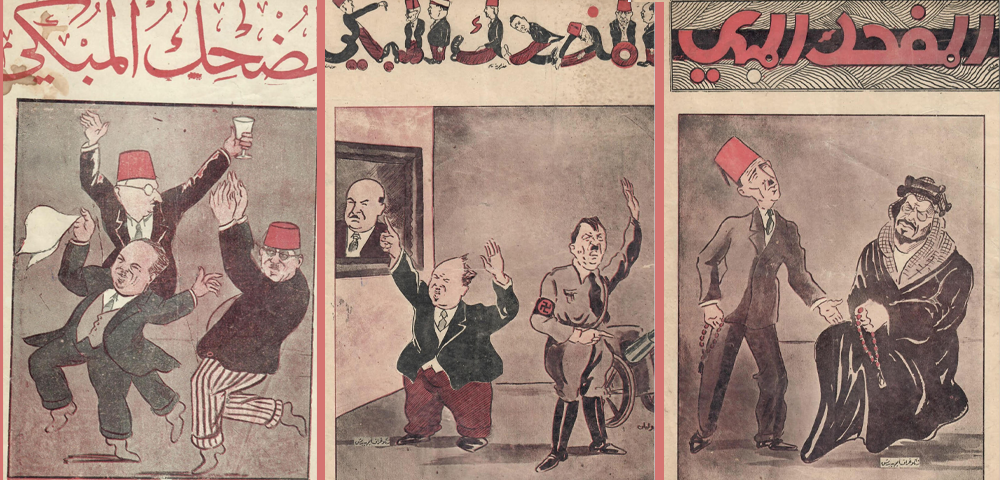 Various covers of the satirical magazine Al-Mudhik Al-Mubki
Various covers of the satirical magazine Al-Mudhik Al-Mubki
In the opening statement of the first issue of Al-Mudhik Al-Mubki, Habib Kahaleh wrote, “As for our plan, we promise the reader that the magazine will be straightforward, honest and truthful, even if it angers some. We will not adopt the stance of Al-Ahnaf, who used to listen to poets praising Yazid ibn Mu'awiya while remaining silent. And when Yazid asked him, 'Why are you silent, Abu Bahr?', he replied, 'I fear Allah if I lie, and I fear you if I tell the truth!' So, we will strive to fear Allah in our frankness. And if some get angry while we speak the truth, let them drink the sea.”
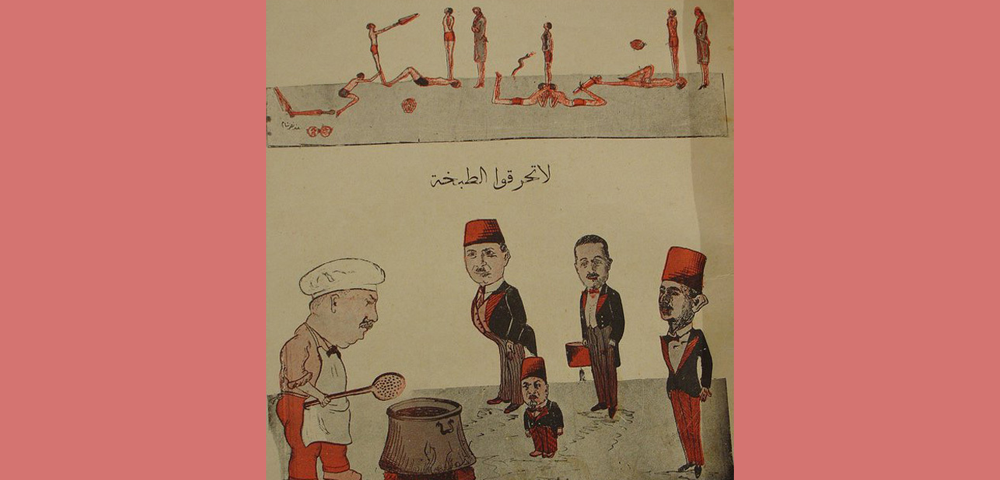 A cover of the Al-Mudhik Al-Mubki magazine
A cover of the Al-Mudhik Al-Mubki magazine
Articles in Al-Mudhik Al-Mubki were written in a blend of colloquial and formal Arabic, a bold approach that sparked the displeasure of the Arabic Language Academy of Damascus. The magazine featured various sections such as:
Political Junkie Discourse, in which the editor would move from one topic to another without any link or connection, questioning ministers and raising the most important contemporary issues.
On the Phone, where the editor would call a minister and quickly interview him about a contentious local issue.
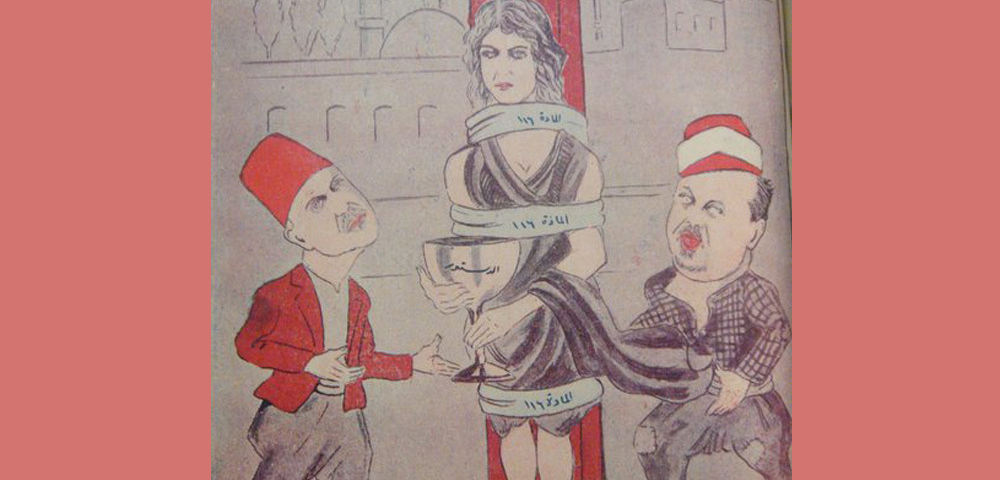 A cover of the Al-Mudhik Al-Mubki magazine
A cover of the Al-Mudhik Al-Mubki magazine
The Parsing of Al-Mudhik Al-Mubki, where the editor would analyze a verse of poetry related to an important political discussion.
The Court of Al-Mudhik Al-Mubki, where an official would be put in the dock for a specific issue, and the magazine team would pass judgment based on the available information.
They Said, We Said, commentary by the editor on the statements of people and officials.
However, political cartoons and caricatures remained the most distinctive feature that set Al-Mudhik Al-Mubki apart from other Syrian newspapers, and Habib Kahaleh skillfully used it to criticize the ruling political class during the French mandate era.
Confrontation with 'Sheikh Taj'
One of the magazine's first targets was Prime Minister Taj al-Din al-Hasani during the battle over Syria's first republican constitution in 1928. Al-Mudhik Al-Mubki featured caricatures of 'Sheikh Taj' on every cover. Sheikh Taj’s distinct appearance made him an easy target - he was short, with a round frame, and donned a white turban. One drawing showed National Deputy Fakhri al-Baroudi say to Taj “Isn't it time for you to step down?”, only for Sheikh Taj to reply, “Never, I will not leave except by order of the French High Commissioner.”
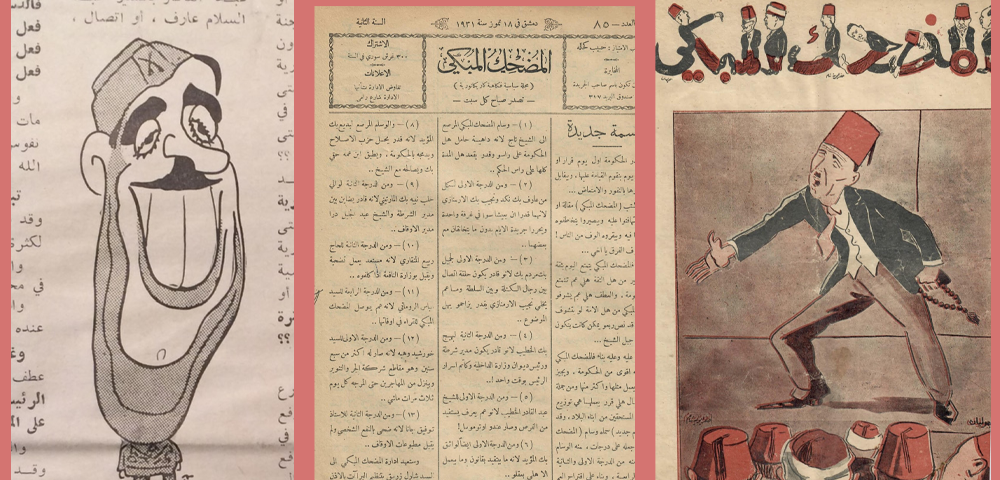 Various covers of Al-Mudhik Al-Mubki magazine
Various covers of Al-Mudhik Al-Mubki magazine
In retaliation, Sheikh Taj fined the magazine and suspended it for three months. Upon its return, the cover depicted the magazine as a human being emerging from the grave, surrounded by Sheikh Taj and his ministers shouting, “Woe is me… Al-Mudhik Al-Mubki has returned!”
The magazine was suspended for a second time after depicting Sheikh Taj singing the French national anthem, which led the leader to once again order the closure of the magazine. Administrative suspension at the time was in the hands of the government, and they would often impose it on the press. However, there was relative freedom which allowed such mockery and satire with no major repercussions.
The confrontation with Haqqi Al-Azm
In 1932, Muhammad Ali Al-Abid was elected president of the republic, and Haqqi Al-Azm was appointed prime minister. Al-Abid was affiliated with the opponents of the Syrian National Bloc, to which Habib Kahaleh belonged.
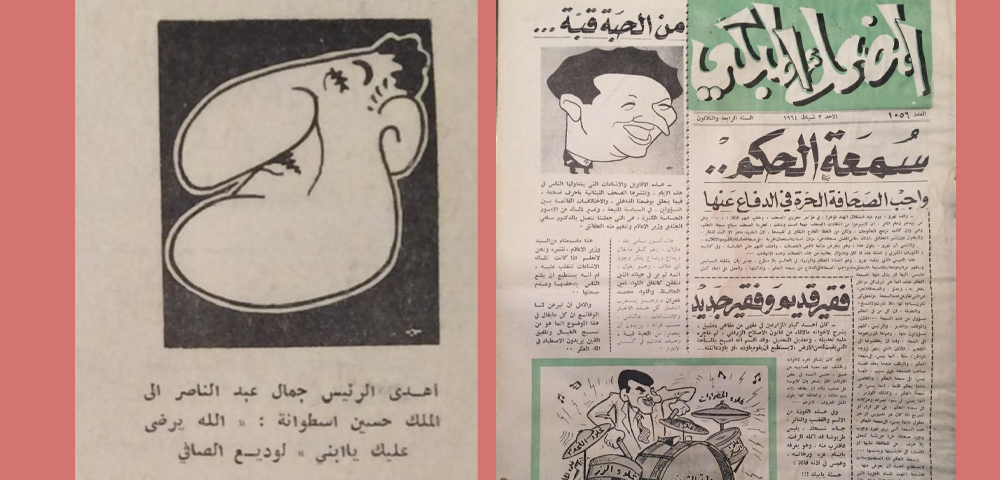 Various covers of the satirical magazine Al-Mudhik Al-Mubki
Various covers of the satirical magazine Al-Mudhik Al-Mubki
Al-Mudhik Al-Mubki welcomed him into the political arena with a caricature showing two dogs fighting over the remains of a carcass. In a clever play on puns in the Arabic language, one dog says, “Ana haqqi al-lahm (I have a right to the meat),” to which the second responds, “And ana Haqqi Al-Azm (and I have a right to the bone)!” Like Sheikh Taj before him, Haqqi Al-Azm responded by shutting down the magazine.
Voluntary pilgrimage
Habib Kahaleh participated in establishing the Syrian Newspaper Editors' Syndicate. In 1936, he issued the illustrated magazine Al-Musawar (The Illustrated) before he was elected as a deputy for Damascus in the Syrian Parliament in 1947, just months after the French forces evacuated Syria.
One of the magazine's first targets was Prime Minister Taj al-Din al-Hasani during the battle over Syria's first republican constitution in 1928. In retaliation, Sheikh Taj fined the magazine and suspended it for three months. Upon its return, the cover depicted the magazine as a human being emerging from the grave, surrounded by Sheikh Taj and his ministers shouting, “Woe is me… Al-Mudhik Al-Mubki has returned!”
In 1956, it was decided Al-Mudhik Al-Mubki would temporarily and voluntarily close due to the growing influence of the intelligence and the director of the second office, Abdel Hamid Al-Sarraj. It did not resume publishing until the early days of Syria's secession, after the arrest of Al-Sarraj and the end of the United Arab Republic with Egypt.
In an opening statement, Kahaleh explained, “This magazine returns to publication after a long absence, of which I accuse no one, nor do I attribute it to anyone. Rather, I had intended it of my own volition and of my own free will, because I could not write what I wanted, and I refuse being forced to write what I do not want. So I broke my own pen and retired because, as Oscar Wilde says, a true slave is the one who cannot express his opinion freely.”
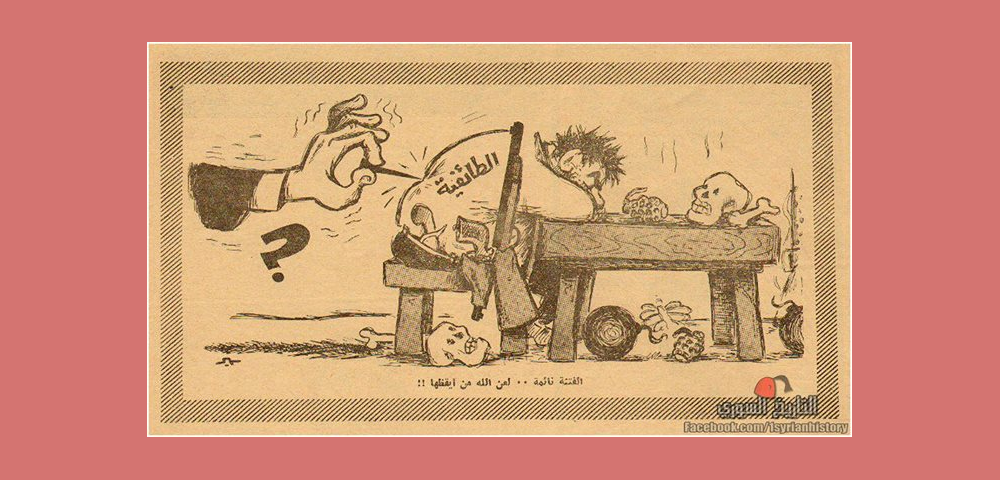 A cover of the Al-Mudhik Al-Mubki magazine
A cover of the Al-Mudhik Al-Mubki magazine
During the secession era, Kahaleh defended press freedom and opposed the prohibition of pro-Gamal Abdel Nasser newspapers, most notably the Al-Ba'ath newspaper. The Baathists remembered and appreciated his brave stance. After they came to power in 1963, Al-Mudhik Al-Mubki was exempted from the ban imposed by the Syrian Revolutionary Command Council, which affected all Syrian publications.
Al-Mudhik Al-Mubki continued publication during the Baath Party years, only ceasing after the death of its owner, as ordered by the Minister of Information, Jameel Shayya, on May 29, 1966. During this period, the magazine featured political caricatures of many politicians but refrained from targeting Syrian military officers, focusing instead on Arab military figures including Iraqi President Abdul Salam Arif, Yemeni President Abdullah Al-Sallal, and Egyptian President Gamal Abdel Nasser.
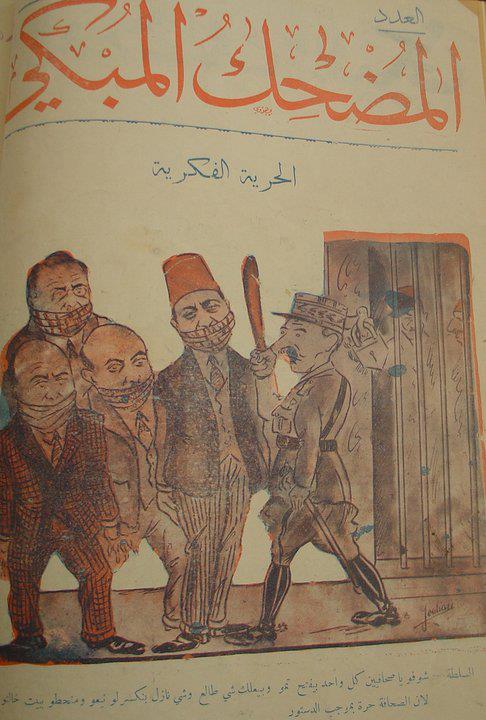 The satirical magazine al-Mudhik al-Mubki mocking freedom of expression under the French Mandate in 1930
The satirical magazine al-Mudhik al-Mubki mocking freedom of expression under the French Mandate in 1930
Raseef22 is a not for profit entity. Our focus is on quality journalism. Every contribution to the NasRaseef membership goes directly towards journalism production. We stand independent, not accepting corporate sponsorships, sponsored content or political funding.
Support our mission to keep Raseef22 available to all readers by clicking here!
Interested in writing with us? Check our pitch process here!
